中英文审计报告-五种审计意见
四种意见类型的审计报告介绍
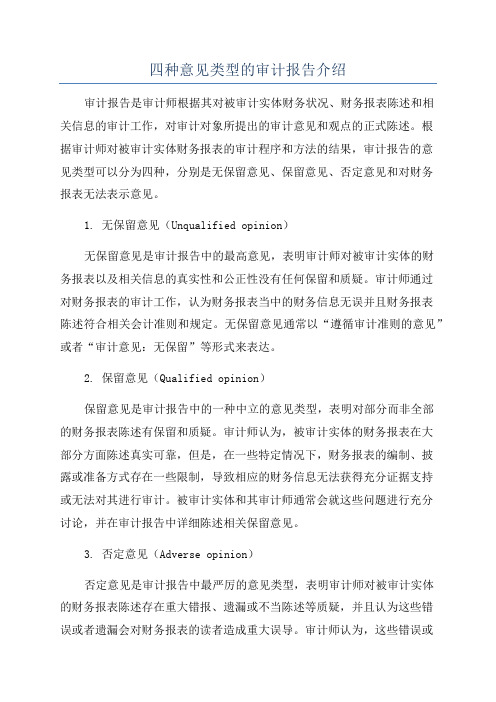
四种意见类型的审计报告介绍审计报告是审计师根据其对被审计实体财务状况、财务报表陈述和相关信息的审计工作,对审计对象所提出的审计意见和观点的正式陈述。
根据审计师对被审计实体财务报表的审计程序和方法的结果,审计报告的意见类型可以分为四种,分别是无保留意见、保留意见、否定意见和对财务报表无法表示意见。
1. 无保留意见(Unqualified opinion)无保留意见是审计报告中的最高意见,表明审计师对被审计实体的财务报表以及相关信息的真实性和公正性没有任何保留和质疑。
审计师通过对财务报表的审计工作,认为财务报表当中的财务信息无误并且财务报表陈述符合相关会计准则和规定。
无保留意见通常以“遵循审计准则的意见”或者“审计意见:无保留”等形式来表达。
2. 保留意见(Qualified opinion)保留意见是审计报告中的一种中立的意见类型,表明对部分而非全部的财务报表陈述有保留和质疑。
审计师认为,被审计实体的财务报表在大部分方面陈述真实可靠,但是,在一些特定情况下,财务报表的编制、披露或准备方式存在一些限制,导致相应的财务信息无法获得充分证据支持或无法对其进行审计。
被审计实体和其审计师通常会就这些问题进行充分讨论,并在审计报告中详细陈述相关保留意见。
3. 否定意见(Adverse opinion)否定意见是审计报告中最严厉的意见类型,表明审计师对被审计实体的财务报表陈述存在重大错报、遗漏或不当陈述等质疑,并且认为这些错误或者遗漏会对财务报表的读者造成重大误导。
审计师认为,这些错误或者不当陈述不仅对特定问题存在不准确的陈述,而且可能对整个财务报表的真实性和可靠性产生负面影响。
在审计报告中,审计师会详细陈述该否定意见的依据和具体问题。
4. 对财务报表无法表示意见(Disclaimer of opinion)对财务报表无法表示意见是审计报告中最不固定的意见类型,通常出现在审计师无法获得足够审计证据的情况下。
审计师可能无法获得充分可靠的由他人提供的证据,或者无法获得与财务报表陈述相关的合适证据。
中英文对照的标准版审计报告
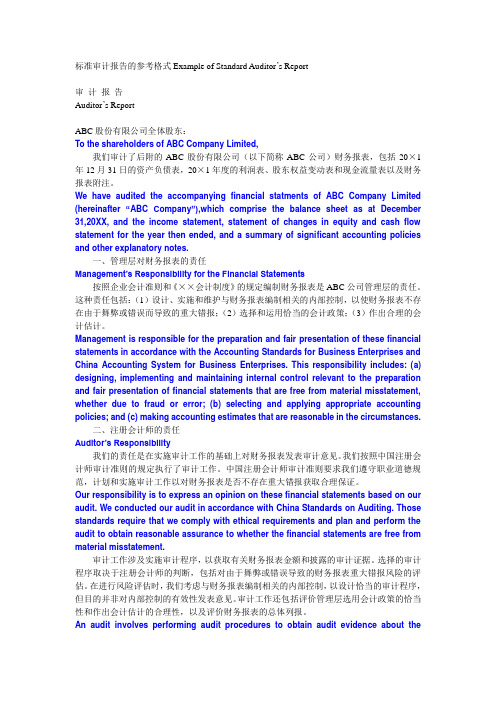
标准审计报告的参考格式Example of Standard Auditor’s Report审计报告Auditor’s ReportABC股份有限公司全体股东:To the shareholders of ABC Company Limited,我们审计了后附的ABC股份有限公司(以下简称ABC公司)财务报表,包括20×1年12月31日的资产负债表,20×1年度的利润表、股东权益变动表和现金流量表以及财务报表附注。
We have audited the accompanying financial statments of ABC Company Limited (hereinafter “ABC Company”),which comprise the balance sheet as at December 31,20XX, and the income statement, statement of changes in equity and cash flow statement for the year then ended, and a summary of significant accounting policies and other explanatory notes.一、管理层对财务报表的责任Management’s Responsibility for the Financial Statements按照企业会计准则和《××会计制度》的规定编制财务报表是ABC公司管理层的责任。
这种责任包括:(1)设计、实施和维护与财务报表编制相关的内部控制,以使财务报表不存在由于舞弊或错误而导致的重大错报;(2)选择和运用恰当的会计政策;(3)作出合理的会计估计。
Management is responsible for the preparation and fair presentation of these financial statements in accordance with the Accounting Standards for Business Enterprises and China Accounting System for Business Enterprises. This responsibility includes: (a) designing, implementing and maintaining internal control relevant to the preparation and fair presentation of financial statements that are free from material misstatement, whether due to fraud or error; (b) selecting and applying appropriate accounting policies; and (c) making accounting estimates that are reasonable in the circumstances.二、注册会计师的责任Auditor’s Responsibility我们的责任是在实施审计工作的基础上对财务报表发表审计意见。
中英文审计报告word精品文档13页
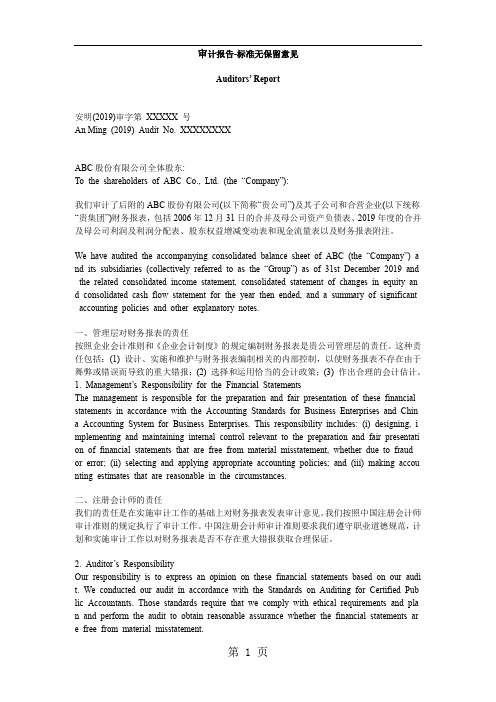
审计报告-标准无保留意见Auditors’ Report安明(2019)审字第XXXXX 号An Ming (2019) Audit No. XXXXXXXXABC股份有限公司全体股东:To the shareholders of ABC Co., Ltd. (the “Company”):我们审计了后附的ABC股份有限公司(以下简称“贵公司”)及其子公司和合营企业(以下统称“贵集团”)财务报表,包括2006年12月31日的合并及母公司资产负债表、2019年度的合并及母公司利润及利润分配表、股东权益增减变动表和现金流量表以及财务报表附注。
We have audited the accompanying consolidated balance sheet of ABC (the “Company”) a nd its subsidiaries (collectively referred to as the “Group”) as of 31st December 2019 and the related consolidated income statement, consolidated statement of changes in equity an d consolidated cash flow statement for the year then ended, and a summary of significant accounting policies and other explanatory notes.一、管理层对财务报表的责任按照企业会计准则和《企业会计制度》的规定编制财务报表是贵公司管理层的责任。
这种责任包括:(1) 设计、实施和维护与财务报表编制相关的内部控制,以使财务报表不存在由于舞弊或错误而导致的重大错报;(2) 选择和运用恰当的会计政策;(3) 作出合理的会计估计。
审计报告4种
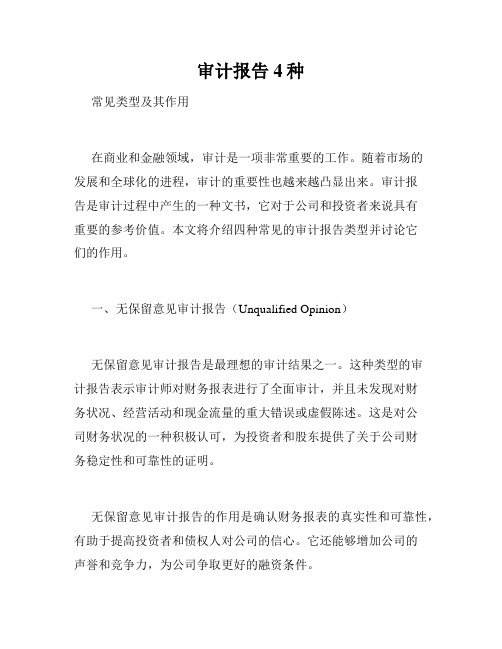
审计报告4种常见类型及其作用在商业和金融领域,审计是一项非常重要的工作。
随着市场的发展和全球化的进程,审计的重要性也越来越凸显出来。
审计报告是审计过程中产生的一种文书,它对于公司和投资者来说具有重要的参考价值。
本文将介绍四种常见的审计报告类型并讨论它们的作用。
一、无保留意见审计报告(Unqualified Opinion)无保留意见审计报告是最理想的审计结果之一。
这种类型的审计报告表示审计师对财务报表进行了全面审计,并且未发现对财务状况、经营活动和现金流量的重大错误或虚假陈述。
这是对公司财务状况的一种积极认可,为投资者和股东提供了关于公司财务稳定性和可靠性的证明。
无保留意见审计报告的作用是确认财务报表的真实性和可靠性,有助于提高投资者和债权人对公司的信心。
它还能够增加公司的声誉和竞争力,为公司争取更好的融资条件。
二、保留意见审计报告(Qualified Opinion)保留意见审计报告是在审计过程中发现了一些限制或不足,但这些问题不是严重到使财务报表整体失真或不能可靠地表示公司的财务状况。
审计师在这种情况下会使用一种保留意见表达对财务报表的保留观点。
保留意见审计报告的作用是提醒读者注意报表中存在的问题和风险。
这种审计报告为投资者提供了有关公司财务可行性和可持续性的一些警示信号。
投资者需要更加仔细地分析和评估这些风险,以便作出正确的投资决策。
三、无法表示意见审计报告(Adverse Opinion)无法表示意见审计报告是最严重的审计结果之一。
这种情况发生在审计师确定财务报表中存在重大错误、虚假陈述或不合规的情况下。
审计师无法确认财务报表的可靠性,因此无法给出肯定的意见。
无法表示意见审计报告对公司的影响非常严重。
它可能导致投资者和债权人对公司产生质疑,并可能引起公司声誉和信任的损害。
此外,这种审计报告经常会导致相应的法律诉讼和调查。
四、无保留但有关注项审计报告(Disclaimer of Opinion)无保留但有关注项审计报告发生在审计师由于某种原因无法获得足够的审计证据,从而无法对财务报表的全部内容表达意见。
审计报告说明中英文版
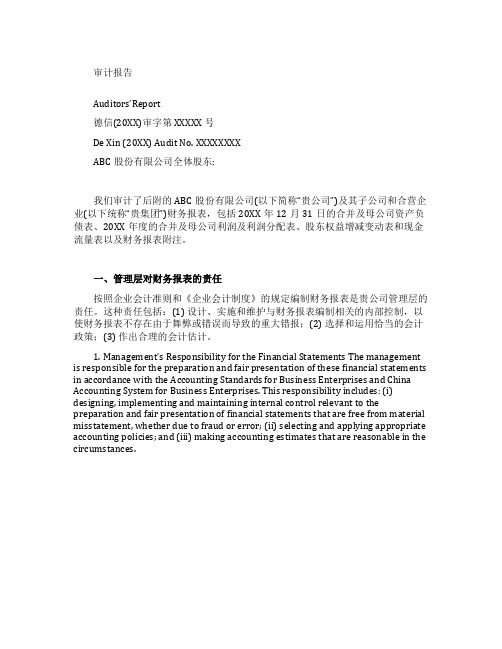
审计报告Auditors’Report德信(20XX)审字第 XXXXX 号De Xin (20XX) Audit No. XXXXXXXXABC股份有限公司全体股东:我们审计了后附的ABC股份有限公司(以下简称“贵公司”)及其子公司和合营企业(以下统称“贵集团”)财务报表,包括20XX年12月31日的合并及母公司资产负债表、20XX年度的合并及母公司利润及利润分配表、股东权益增减变动表和现金流量表以及财务报表附注。
一、管理层对财务报表的责任按照企业会计准则和《企业会计制度》的规定编制财务报表是贵公司管理层的责任。
这种责任包括:(1) 设计、实施和维护与财务报表编制相关的内部控制,以使财务报表不存在由于舞弊或错误而导致的重大错报;(2) 选择和运用恰当的会计政策;(3) 作出合理的会计估计。
1. Management’s Responsibility for the Financial Statements The management is responsible for the preparation and fair presentation of these financial statements in accordance with the Accounting Standards for Business Enterprises and China Accounting System for Business Enterprises. This responsibility includes: (i) designing, implementing and maintaining internal control relevant to the preparation and fair presentation of financial statements that are free from material misstatement, whether due to fraud or error; (ii) selecting and applying appropriate accounting policies; and (iii) making accounting estimates that are reasonable in the circumstances.。
审计报告说明中英文版
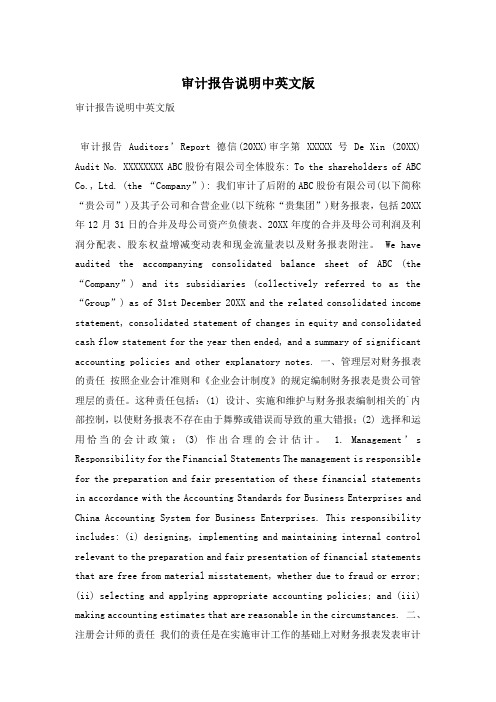
审计报告说明中英文版审计报告说明中英文版审计报告 Auditors’Report 德信(20XX)审字第 XXXXX 号 De Xin (20XX) Audit No. XXXXXXXX ABC股份有限公司全体股东: To the shareholders of ABC Co., Ltd. (the “Company”): 我们审计了后附的ABC股份有限公司(以下简称“贵公司”)及其子公司和合营企业(以下统称“贵集团”)财务报表,包括20XX 年12月31日的合并及母公司资产负债表、20XX年度的合并及母公司利润及利润分配表、股东权益增减变动表和现金流量表以及财务报表附注。
We have audited the accompanying consolidated balance sheet of ABC (the “Company”) and its subsidiaries (collectively referred to as the “Group”) as of 31st December 20XX and the related consolidated in come statement, consolidated statement of changes in equity and consolidated cash flow statement for the year then ended, and a summary of significant accounting policies and other explanatory notes. 一、管理层对财务报表的责任按照企业会计准则和《企业会计制度》的规定编制财务报表是贵公司管理层的责任。
这种责任包括:(1) 设计、实施和维护与财务报表编制相关的`内部控制,以使财务报表不存在由于舞弊或错误而导致的重大错报;(2) 选择和运用恰当的会计政策;(3) 作出合理的会计估计。
审计英语词汇
审计英语词汇以下是一些审计英语词汇:1. Audit - 审计2. Auditor - 审计师3. Audit Report - 审计报告4. Audit Opinion - 审计意见5. Assurance - 可信性保证6. Compliance - 合规性审计7. Fraud - 欺诈8. Internal Control - 内部控制9. Financial Statements - 财务报表10. Accounts Receivable - 应收账款11. Accounts Payable - 应付账款12. Accrual Accounting - 应计会计13. Adverse Opinion - 否定意见14. Aged Analysis - 年老的分析(法,学)研究15. Agent - 代理人16. Agreed-Upon Procedures - 约定审查业务17. Allowances - 准备金18. Audit Sampling - 审计抽样19. Audit Engagement - 审计业务20. Audit Evidence - 审计证据21. Audit Objective - 审计目标22. Audit Risk - 审计风险23. Audit Plan - 审计计划24. Audit Program - 审计程序25. Audit Procedure - 审计程序26. Audit Sampling Size - 审计抽样大小27. Audit Sampling Rate - 审计抽样比率28. Audit Sampling Probability - 审计抽样概率29. Audit Sampling Method - 审计抽样方法30. Audit Sampling Universe - 审计抽样范围31. Audit Sampling Error - 审计抽样误差32. Audit Sampling Variation - 审计抽样变化33. Audit Sampling Confidence - 审计抽样信心34. Audit Sampling Bias - 审计抽样偏见35. Audit Sampling Detection Rate - 审计抽样检测率36. Audit Sampling Coverage - 审计抽样覆盖率37. Audit Sampling Depth - 审计抽样深度38. Audit Sampling Frequency - 审计抽样频率39. Audit Sampling Rate - 审计抽样比率。
四种审计意见(英文版)
审计报告意见类型有以下四种:无保留意见、保留意见、否定意见和无法表示意见(原为拒绝表示意见)。
下面对这四种意见作了简要解释。
AUDIT REPORTINGAudit Reports are categorized into four categories. Each type is briefly described as follows:UNQUALIFIED OPINION(无保留意见)An unqualified opinion states that the financial statements are presented fairly in conformity with GAAP. However, in some instances, the standard unqualified report may be modified without affecting the unqualified opinion issued on the financial statements.QUALIFIED OPINION. (保留意见)A qualified opinion is issued when the financial statements present the entity's financial position, results of operations, and cash flows in conformity with GAAP except for the matter of the qualification. Qualified opinions are issued, in some cases, when: (1) a scope limitation, or (2) a departure from GAAP exists.ADVERSE OPINION. (否定意见)When issuing an adverse opinion, the auditor concludes that the financial statements do not present the entity's financial position, results of operations, and cash flows in conformity with GAAP. This type of opinion is only issued when the financial statements contain very material departures from GAAP.DISCLAIMER OF OPINION.(无法表示意见)A disclaimer of opinion is issued when the auditor is unable to form an opinion on an entity's financial statements. A disclaimer may be issued in cases when: (1) the auditor is not independent with respect to the entity under audit, (2) a material scope limitation exists, or (3) a significant uncertainty exists.SAS No. 58 suggests seven principal reasons why an independent auditor my depart from the wording of the standard report. These are:1. Limitations on the scope of the auditor's examination.2. Division of responsibility.3. Lack of conformity with GAAP.4. A departure from an accounting principle set by the body designated to establish such principles.5. Lack of consistency.6. Uncertainties.7. Emphasizing a matter.AUDPORT: Expert System EvaluationThis knowledged-based system uses the criteria contained in Statement on Auditing Standards No. 58 to determine the type of audit opinion that should be rendered by anexternal auditor after conducting a financial audit under generally accepted auditing standards (GAAS). Assessment of the educational impact of the Audport expert system is described in a paper by L. Murphy Smith and R. Stephen McDuffie, "Impact of an Audit Reporting Expert System on Learning Performance: A Teaching Note" (forthcoming in Accounting Education). This Web-based HTM (hypertext markup language) approach was developed by Professors Smith and McDuffie, with assistance from Ms. Jennifer Calhoun.Answer the questions that appear on the screen by clicking on the correct answer. Based upon your answers, the criteria contained in SAS No. 58 will be evaluated. As each criterion is evaluated you will be provided with information on the screen either that a particular type of audit opinion should be rendered by the auditor or that additional evaluation is necessary.If the type of audit opinion to be rendered has been determined, you have completed the evaluation and can then quit the consultation. If additional evaluation is necessary to determine the type of audit opinion to render, this will be indicated to you and you will need to continue the consultation. The system only considers one audit problem for each consultation. However, many potential problems can be evaluated by the system.Two sets of terms are important when using this system, material versus pervasive and significant versus severe. Pervasive is of more concern than material, and severe is of more concern than significant. For example, a departure from generally accepted accounting principles that is not immaterial and is not justified either has a material affect on the financial statements or a pervasive affect on the financial statements, but not both. Depending on the situation, either a qualified opinion or an adverse opinion will be rendered.Significant and severe are used in describing a circumstance-imposed scope limitation. One or the other terms can be used to describe a situation but both terms can not be used to describe the same situation.A list of the questions that make up the AUDPORT Web-based expert system are available for you to review under 'AUDPORT questions' below. At any time during the consultation you may quit the consultation and return to the AUDPORT homepage.。
英文审计报告及附注
英文审计报告及附注Here is a 614-word English essay on the topic of "English Audit Report and Notes":The Importance of Audit Reports and Notes in Financial ReportingFinancial reporting is a critical aspect of any organization, providing stakeholders with a comprehensive understanding of the company's financial health and performance. At the heart of this reporting process lies the audit report and its accompanying notes, which play a vital role in ensuring transparency, accuracy, and accountability.An audit report is a formal document prepared by an independent and qualified auditor that presents the findings and conclusions of their examination of an organization's financial statements. This report serves as a crucial tool for investors, lenders, regulators, and other interested parties, allowing them to make informed decisions based on the organization's financial standing.The audit report typically includes an opinion on the fairness and accuracy of the financial statements, addressing whether they have been prepared in accordance with the applicable accountingstandards and principles. The auditor's opinion can be unqualified (indicating the financial statements are fairly presented), qualified (indicating certain issues or limitations), adverse (indicating the financial statements are not fairly presented), or a disclaimer of opinion (indicating the auditor was unable to obtain sufficient evidence to form an opinion).Accompanying the audit report are the auditor's notes, which provide additional information and context to the financial statements. These notes are an essential component of the financial reporting process, as they offer detailed explanations and clarifications on various aspects of the organization's financial activities.The notes to the financial statements often include information such as:- Significant accounting policies: This section outlines the key accounting principles and methods used by the organization in preparing its financial statements.- Explanations of financial line items: The notes provide detailed breakdowns and explanations of the various accounts and balances reported in the financial statements, helping readers better understand the organization's financial position and performance. - Contingencies and commitments: The notes disclose any potential liabilities, such as pending lawsuits or contractual obligations, thatcould have a material impact on the organization's financial outlook. - Related party transactions: The notes outline any significant transactions or relationships between the organization and its related parties, such as subsidiaries, affiliates, or key management personnel.- Subsequent events: The notes inform readers of any significant events that occurred after the reporting period but before the financial statements were issued, which could affect the organization's financial position or future performance.The inclusion of these detailed notes is crucial, as it provides stakeholders with a more comprehensive understanding of the organization's financial situation. By enhancing transparency and disclosure, the notes to the financial statements help to build trust and confidence in the organization's financial reporting.Furthermore, the audit report and accompanying notes play a vital role in regulatory compliance. In many jurisdictions, publicly traded companies are required to have their financial statements audited and to disclose the resulting report and notes as part of their regulatory filings. This ensures that the financial information presented to the public is reliable, accurate, and in compliance with applicable accounting standards and regulations.In conclusion, the audit report and its accompanying notes areessential components of financial reporting, providing stakeholders with a detailed and transparent view of an organization's financial health and performance. By ensuring the integrity and reliability of financial information, these documents play a crucial role in supporting informed decision-making, fostering trust, and upholding regulatory compliance. As such, the careful preparation and thorough review of audit reports and notes should be a top priority for any organization seeking to maintain the confidence of its stakeholders.。
中英文审计报告
审计报告-标准无保留意见Auditors Report安明(2007)审字第XXXXX 号An Ming (2007) Audit No. XXXXXXXXABC股份有限公司全体股东:To the shareholders of ABC Co., Ltd. (the "Company"):我们审计了后附的ABC股份有限公司(以下简称贵公司”及其子公司和合营企业(以下统称贵集团”财务报表,包括2006年12月31日的合并及母公司资产负债表、2006年度的合并及母公司利润及利润分配表、股东权益增减变动表和现金流量表以及财务报表附注。
We have audited the accompanying consolidated balance sheet of ABC (the " Company" a nd its subsidiaries (collectively referred to as the "Group"a$ of 31st December 2006 and the related consolidated income statement, consolidated statement of changes in equity an d consolidated cash flow statement for the year then ended, and a summary of significant accounting policies and other explanatory notes.一、管理层对财务报表的责任按照企业会计准则和〈〈企业会计制度》的规定编制财务报表是贵公司管理层的责任。
这种责任包括:(1)设计、实施和维护与财务报表编制相关的内部控制,以使财务报表不存在由于舞弊或错误而导致的重大错报;(2)选择和运用恰当的会计政策;(3)作出合理的会计估计。
- 1、下载文档前请自行甄别文档内容的完整性,平台不提供额外的编辑、内容补充、找答案等附加服务。
- 2、"仅部分预览"的文档,不可在线预览部分如存在完整性等问题,可反馈申请退款(可完整预览的文档不适用该条件!)。
- 3、如文档侵犯您的权益,请联系客服反馈,我们会尽快为您处理(人工客服工作时间:9:00-18:30)。
审计报告-标准无保留意见Auditors’ Report安明(2007)审字第XXXXX 号An Ming (2007) Audit No. XXXXXXXXABC股份有限公司全体股东:To the shareholders of ABC Co., Ltd. (the “Company”):我们审计了后附的ABC股份有限公司(以下简称“贵公司”)及其子公司和合营企业(以下统称“贵集团”)财务报表,包括2006年12月31日的合并及母公司资产负债表、2006年度的合并及母公司利润及利润分配表、股东权益增减变动表和现金流量表以及财务报表附注。
We have audited the accompanying consolidated balance sheet of ABC (the “Company”) a nd its subsidiaries (collectively referred to as the “Group”) as of 31st December 2006 and the related consolidated income statement, consolidated statement of changes in equity an d consolidated cash flow statement for the year then ended, and a summary of significant accounting policies and other explanatory notes.一、管理层对财务报表的责任按照企业会计准则和《企业会计制度》的规定编制财务报表是贵公司管理层的责任。
这种责任包括:(1) 设计、实施和维护与财务报表编制相关的内部控制,以使财务报表不存在由于舞弊或错误而导致的重大错报;(2) 选择和运用恰当的会计政策;(3) 作出合理的会计估计。
1. Management’s Responsibility for the Financial StatementsThe management is responsible for the preparation and fair presentation of these financial statements in accordance with the Accounting Standards for Business Enterprises and Chin a Accounting System for Business Enterprises. This responsibility includes: (i) designing, i mplementing and maintaining internal control relevant to the preparation and fair presentati on of financial statements that are free from material misstatement, whether due to fraudor error; (ii) selecting and applying appropriate accounting policies; and (iii) making accou nting estimates that are reasonable in the circumstances.二、注册会计师的责任我们的责任是在实施审计工作的基础上对财务报表发表审计意见。
我们按照中国注册会计师审计准则的规定执行了审计工作。
中国注册会计师审计准则要求我们遵守职业道德规范,计划和实施审计工作以对财务报表是否不存在重大错报获取合理保证。
2. Auditor’s ResponsibilityOur responsibility is to express an opinion on these financial statements based on our audi t. We conducted our audit in accordance with the Standards on Auditing for Certified Pub lic Accountants. Those standards require that we comply with ethical requirements and plan and perform the audit to obtain reasonable assurance whether the financial statements ar e free from material misstatement.审计工作涉及实施审计程序,以获取有关财务报表金额和披露的审计证据。
选择的审计程序取决于注册会计师的判断,包括对由于舞弊或错误导致的财务报表重大错报风险的评估。
在进行风险评估时,我们考虑与财务报表编制相关的内部控制,以设计恰当的审计程序,但目的并非对内部控制的有效性发表意见。
审计工作还包括评价管理层选用会计政策的恰当性和作出会计估计的合理性,以及评价财务报表的总体列报。
An audit involves performing procedures to obtain audit evidence about the amounts and disclosures in the financial statements. The procedures selected depend on the auditor’s jud gment, including the assessment of the risks of material misstatement of the financial state ments, whether due to fraud or error. In making those risk assessments, the auditor consid ers internal control relevant to the entity’s preparation and fair presentation of the financial statements in order to design audit procedures that are appropriate in the circumstances, b ut not for the purpose of express ing an opinion on the effectiveness of the entity’s interna l control. An audit also includes evaluating the appropriateness of accounting policies used and the reasonableness of accounting estimates made by management, as well as evaluati ng the overall presentation of the financial statements.我们相信,我们获取的审计证据是充分的、适当的,为发表审计意见提供了基础。
We believe that the audit evidence we have obtained is sufficient and appropriate to provi de a basis for our audit opinion.三、审计意见我们认为,上述财务报表已经按照企业会计准则和《企业会计制度》的规定编制,在所有重大方面公允反映了贵集团和贵公司2006年12月31日的财务状况以及2006年度的经营成果和现金流量。
3. OpinionIn our opinion, the financial statements give a true and fair view of the financial position of the Company and of the Group as of 31 December 2006, and of its financial perform ance and its cash flows for the year then ended in accordance with the Accounting Standa rds for Business Enterprises and China Accounting System for Business Enterprises.安明会计师事务所中国注册会计师中国北京XXXXX XXXXXXAn Ming Certified Public countantsBeijing P.R.China Registered in P. R.China29th March 2007审计报告-无保留意见带说明段Auditors’ Report安明(2007)审字第XXXXX 号An Ming (2007) Audit No. XXXXXXXXABC股份有限公司全体股东:To the shareholders of ABC Co., Ltd. (the “Company”):我们审计了后附的ABC股份有限公司(以下简称“贵公司”)及其子公司和合营企业(以下统称“贵集团”)财务报表,包括2006年12月31日的合并及母公司资产负债表、2006年度的合并及母公司利润及利润分配表、股东权益增减变动表和现金流量表以及财务报表附注。
We have audited the accompanying consolidated balance sheet of ABC (the “Company”) a nd its subsidiaries (collectively referred to as the “Group”) as of 31st December 2006 and the related consolidated income statement, consolidated statement of changes in equity an d consolidated cash flow statement for the year then ended, and a summary of significant accounting policies and other explanatory notes.一、管理层对财务报表的责任按照企业会计准则和《企业会计制度》的规定编制财务报表是贵公司管理层的责任。
